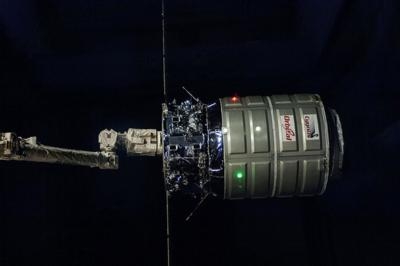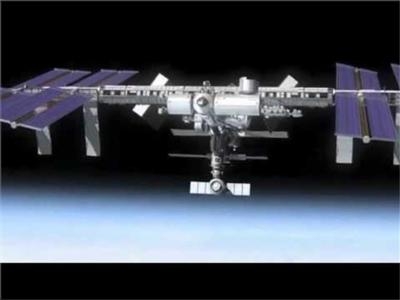Wed, Jun 15, 2016
Has Departed ISS, Now Conducting Science In Space
The “S.S. Rick Husband” Cygnus spacecraft successfully departed from the International Space Station at 0930 EDT Tuesday, completing an 81-day stay at the orbiting laboratory. The mission, known as OA-6, began on March 22, 2016 when Cygnus launched aboard a United Launch Alliance Atlas V rocket from Cape Canaveral Air Force Station, Florida. Cygnus delivered 7,900 pounds of cargo and science experiments to astronauts aboard the station. Prior to its departure, the astronauts loaded the unmanned cargo module with approximately 4,087 pounds of items for disposal.

Orbital ATK’s fifth mission under NASA’s Commercial Resupply Services-1 (CRS-1) contract now begins its second phase before the planned reentry of Cygnus into Earth’s atmosphere. Cygnus will conduct three, in-orbit science experiments: the Spacecraft Fire Experiment-I (Saffire-I), the deployment of five CubeSat satellites from the NanoRacks CubeSat Deployer and the Reentry Breakup Recorder (REBR) test.
“Cygnus had a successful, two-and-a-half-month stay at the International Space Station, delivering vital cargo to the astronauts,” said Frank Culbertson, President of Orbital ATK’s Space Systems Group. “Now, the work continues as we demonstrate expanded capabilities for Cygnus beyond its core cargo delivery function. The next phase of this mission marks the first time that Cygnus will serve as a research platform to support science experiments that enable deep space exploration. Our ability to conduct these tests further highlights the versatility and flexibility that Cygnus offers to our customers.”
The Spacecraft Fire Experiment-I (Saffire-I) will feature the first of three tests to study the behavior of large fires in microgravity. Following departure from the International Space Station, engineers will remotely conduct the first Saffire experiment. Onboard Cygnus, the experiment developed at NASA’s Glenn Research Center with the support of NASA’s Advanced Exploration Systems Division will intentionally ignite and record a large-scale fire that will grow and advance until it burns itself out.

Next, using a deployer provided by NanoRacks, the “S.S. Rick Husband” will place five CubeSats into orbit to conduct their own autonomous missions.
The final experiment to take place aboard Cygnus features the Reentry Breakup Recorder (REBR). REBR will measure and record data during Cygnus’ safe destructive reentry into Earth’s atmosphere. The scheduled date for reentry is June 22, officially ending the OA-6 mission.
(Source: Orbital ATK news release. Images from file)
More News
He Attempted To Restart The Engine Three Times. On The Third Restart Attempt, He Noticed That Flames Were Coming Out From The Right Wing Near The Fuel Cap Analysis: The pilot repor>[...]
Make Sure You NEVER Miss A New Story From Aero-News Network Do you ever feel like you never see posts from a certain person or page on Facebook or Instagram? Here’s how you c>[...]
From 2009 (YouTube Edition): Leading Air Show Performers Give Their Best Advice for Newcomers On December 6th through December 9th, the Paris Las Vegas Hotel hosted over 1,500 air >[...]
Aero Linx: NASA ASRS ASRS captures confidential reports, analyzes the resulting aviation safety data, and disseminates vital information to the aviation community. The ASRS is an i>[...]
“For our inaugural Pylon Racing Seminar in Roswell, we were thrilled to certify 60 pilots across our six closed-course pylon race classes. Not only did this year’s PRS >[...]
 NTSB Final Report: Rutan Long-EZ
NTSB Final Report: Rutan Long-EZ ANN FAQ: Turn On Post Notifications
ANN FAQ: Turn On Post Notifications Classic Aero-TV: ICAS Perspectives - Advice for New Air Show Performers
Classic Aero-TV: ICAS Perspectives - Advice for New Air Show Performers ANN's Daily Aero-Linx (06.28.25)
ANN's Daily Aero-Linx (06.28.25) Aero-News: Quote of the Day (06.28.25)
Aero-News: Quote of the Day (06.28.25)




